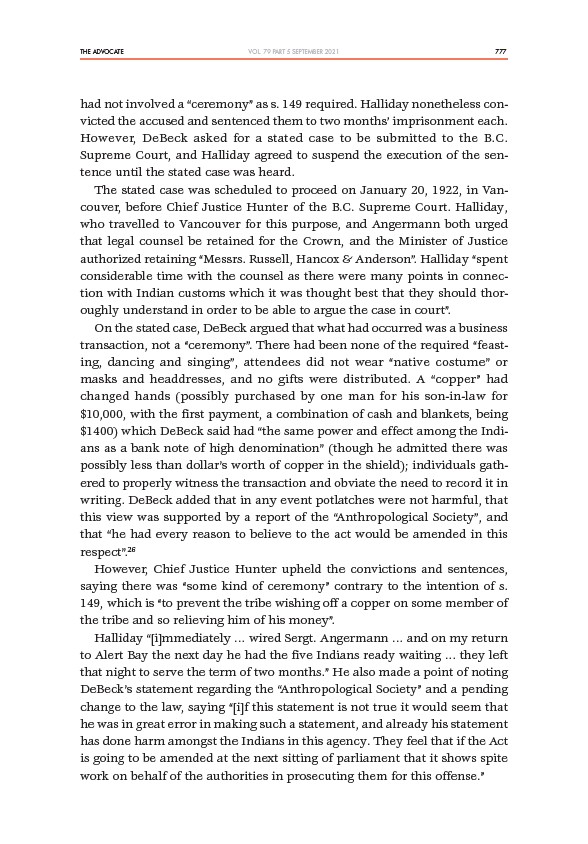
THE ADVOCATE 777
VOL. 79 PART 5 SEPTEMBER 2021
had not involved a “ceremony” as s. 149 required. Halliday nonetheless convicted
the accused and sentenced them to two months’ imprisonment each.
However, DeBeck asked for a stated case to be submitted to the B.C.
Supreme Court, and Halliday agreed to suspend the execution of the sentence
until the stated case was heard.
The stated case was scheduled to proceed on January 20, 1922, in Vancouver,
before Chief Justice Hunter of the B.C. Supreme Court. Halliday,
who travelled to Vancouver for this purpose, and Angermann both urged
that legal counsel be retained for the Crown, and the Minister of Justice
authorized retaining “Messrs. Russell, Hancox & Anderson”. Halliday “spent
considerable time with the counsel as there were many points in connection
with Indian customs which it was thought best that they should thoroughly
understand in order to be able to argue the case in court”.
On the stated case, DeBeck argued that what had occurred was a business
transaction, not a “ceremony”. There had been none of the required “feasting,
dancing and singing”, attendees did not wear “native costume” or
masks and headdresses, and no gifts were distributed. A “copper” had
changed hands (possibly purchased by one man for his son-in-law for
$10,000, with the first payment, a combination of cash and blankets, being
$1400) which DeBeck said had “the same power and effect among the Indians
as a bank note of high denomination” (though he admitted there was
possibly less than dollar’s worth of copper in the shield); individuals gathered
to properly witness the transaction and obviate the need to record it in
writing. DeBeck added that in any event potlatches were not harmful, that
this view was supported by a report of the “Anthropological Society”, and
that “he had every reason to believe to the act would be amended in this
respect”.26
However, Chief Justice Hunter upheld the convictions and sentences,
saying there was “some kind of ceremony” contrary to the intention of s.
149, which is “to prevent the tribe wishing off a copper on some member of
the tribe and so relieving him of his money”.
Halliday “immediately … wired Sergt. Angermann … and on my return
to Alert Bay the next day he had the five Indians ready waiting … they left
that night to serve the term of two months.” He also made a point of noting
DeBeck’s statement regarding the “Anthropological Society” and a pending
change to the law, saying “if this statement is not true it would seem that
he was in great error in making such a statement, and already his statement
has done harm amongst the Indians in this agency. They feel that if the Act
is going to be amended at the next sitting of parliament that it shows spite
work on behalf of the authorities in prosecuting them for this offense.”